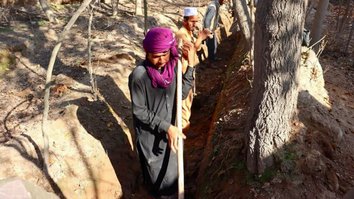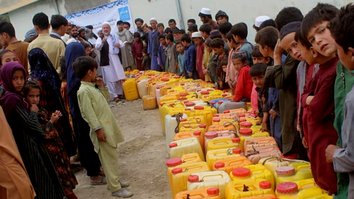BALKH -- After two decades of difficulties accessing drinking water, 314 families living in rural areas of Chamtal and Chahar Bolak districts of Balkh province now have access to potable water.
The Agency for Technical Co-operation and Development (ACTED) implemented the two potable water projects with funding from the United Nations Children's Fund (UNICEF).
Work on the two projects started in December and they were formally inaugurated on February 27, said Yar Mohammad Shabir, director of the Balkh Department of Rural Rehabilitation and Development.
In total they cost more than 11 million AFN ($123,000), he said.
"The first water supply network is 2,680 metres long and includes a 120-metre-deep well, a concrete water reservoir with the capacity of 23 cubic metres, 41 water taps, a steel water tank 10 metres tall, 20 solar panels and other equipment in the Shorabi village of Chamtal district," he said.
"The second network is 5,128 metres long, includes a concrete water reservoir of 12 metres with the capacity of 23 cubic metres, 70 water taps, a 150-metre-deep well and 36 solar panels, implemented in the Jangora village of Chahar Bolak district," he said.
The implementation of such projects is very effective in addressing the public's needs, Shabir said, calling on local residents to play their part in maintaining the water supply networks and using them properly.
"Residents of those areas were facing a shortage of potable water, but the implementation of these two projects has provided access to potable water for hundreds of families," said Noorullah Mohammad, governor of Chamtal district.
"As a second step, we are planning to address the needs of the public in terms of roads and medical clinics, and discussions have also been held with donors in this regard," he said.
"Fortunately, our people now have access to potable water, thanks to the project," he said.
A permanent solution
Residents of Shorabi and Jangora villages welcome the provision of potable water to their houses.
Nangialai Amiri, 36, who lives in the Shorabi village, said the residents of his village did not have access to potable water for the past two decades.
Residents had to use water from a river that passes through several villages, but the water level had dropped from droughts, he said.
"River water is not clean and caused stomach and kidney problems as well as diseases among children, but [residents] had no other option," he said.
"People in this village are poor and would not have been able to build a water supply system without the support of local and international agencies," he added.
Ali Akbar, 52, of Jangora village, said residents of his village and several other nearby villages used to obtain water from a distant well.
"Children and women faced many problems fetching water from the well using pushcarts or donkeys, or carrying water containers by hand in hot summers and cold winters," he said.
"We requested many times that officials build us a water supply network, but no one bothered to listen."
"Now, we are very happy that an aid agency came and addressed our problem permanently and we now have access to potable water," he said.
'Critical' assistance
Nooruddin Haidari, a pediatrician in Mazar-e-Sharif, welcomed the assistance provided by international aid agencies across Afghanistan, describing their work as "critical".
"Sadly, hundreds of [residents] suffer from different diseases every year due to the lack of clean drinking water," he said.
"Unfortunately, drinking unclean water leads to diarrhoea in children and stomach and kidney stone issues in adults."
International organisations have increased their activities in recent months to address inhabitants' problems, especially in rural areas, said Ali Ahmad Mohammadi, 38, a resident of Mazar-e-Sharif.
"We have seen with our own eyes in recent months that international organisations and aid agencies are busy working on various projects such as the provision of potable and irrigation water as well as the construction of canals and their retaining walls, roads, schools and medical clinics."
"We call on international organisations not to abandon the people of Afghanistan and Balkh," he said. "[They] cannot address all these challenges on their own."

![A drinking water storage facility funded by the United Nations Children's Fund (UNICEF) is shown February 27 in Chamtal district, Balkh province. [Balkh Department of Rural Rehabilitation and Development]](/cnmi_st/images/2023/03/08/41090-b-585_329.jpg)







The assistance of the United Nations is very useful in the current situation, and it is very valuable for the poor people of Afghanistan. In this recent month, the United Nations and foreign organizations have increased their attention toward the poor people of Afghanistan and have provided humanitarian aid in every province of Afghanistan which has largely solved the problems of the people of Afghanistan. The United Nations' organizations have undertaken vital projects in most provinces of Afghanistan including drinking water projects, building water reservoirs, cleaning canals, building health clinics, and building bridges. All thse works of the foreign organizations is vital. By building this drinking water reservoir, the problems of the people of Chamtal and Chaharbulak districts of Balkh province were solved and the people of these two districts got access to safe drinking water. For several years, the Afghan government did not solve the problem of the people of these two districts, but today the United Nations solved the problem of the poor people of these two districts. The people of these two districts express their gratitude to the United Nations.
Reply3 Comment
Water is vital for living things, especially food and drinking water, but it makes up a tiny percentage of our planet; a part of it is under the earth's surface, which should be prevented from falling and decreasing. The nutrition area should be kept safe. In the southern provinces, however, they have installed solar panels and used drinking water for agricultural purposes. Using such an amount of underground water in the fields is fierce. At present, the water from the rivers cannot reach the land (the possibilities do not exist); therefore, the farmers should also be careful with the use of solar systems, and the adults at home should advise themselves and their children to be cautious with the help of water.
Reply3 Comment
I read the report from the beginning to the end, and it made me happy as the residents of the local villages were pleased with the construction of water networks. Those who once lacked clean water feel the taste of such writings. Hoping for a day when clean and healthy water taps will reach every home along with the facilities and clean water will be used instead of water from ponds and rivers.
Reply3 Comment